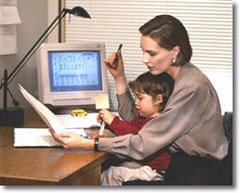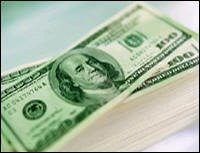Sunday, May 6, 2007
Hidden Advantages Of Working At Home
Working from a home office offers numerous ways to directly save money, and to increase your tax write-offs. Many of these are well known, such as declaring work space that can be written off your rent or mortgage. But in today's Workshop contributor Jeff Moses offers some less-obvious financial advantages of establishing a home-based business.
-- Tremendous savings can be gained from reduced costs for clothing and cleaning. We underestimate how caught up we can get in the fashion game while working on-site in a company's office. Suits and ties for men, dresses and accessories for ladies -- the yearly tab on new clothing can run into the thousands of dollars, especially in high-profile industries such as advertising, law, banking, jewelry, art galleries, interior decoration, etc. Money spent on dry cleaning adds significantly to the total outlay. Working at home allows you to dress casually most of the time, with the rare public appearance demanding the professional image of dress clothing. This doesn't mean that you should let your standards go and start working in your PJ's, but it gives you the option of simpler and less-expensive work attire.
-- Meals can be quicker, less expensive and more healthful when cooked in your kitchen rather than on-the-job corporate lunches. With the time left over from what it would have taken you to travel back and forth to the restaurant, you can catch up on some personal errands or relax and take a refreshing walk.
-- When you work out of your home, you save greatly on all car expenses, including gas, maintenance, repairs, tires, and general wear-and-tear. The most important immediate and long-term saving may simply be avoiding the wear-and-tear on yourself from those many stressful hours commuting.
-- Parents working at home have the option of caring for children instead of plunking them in expensive day care. By planning ahead you can arrange activities that absorb your child's attention (and perhaps even let them learn something beneficial) while having you close by. This situation is often too valuable to put a price on.
-- Even if your self-employed work keeps you too busy to spend long hours with your child, by picking them up from school you can be with them for after-school homework sessions. In the long run, this can prove tremendously beneficial for their educational well-being.
-- The ultimate financial value of working at home is that if you manage your time well (avoiding unnecessary interruptions) you should be able to achieve more during the day than you would in a workplace, where interruptions are commonplace. As Dilbert said in one of the cartoon's daily strips when he was telecommuting from home (and I paraphrase), "Now that I've worked for two hours and accomplished more than I would have during a full day at the office, should I kick off or keep working?" Of course, you'll normally keep on working, accomplishing as much as you possibly can during a day. This will translate into both greater career satisfactions and greatly enhanced income potential.
-- Tremendous savings can be gained from reduced costs for clothing and cleaning. We underestimate how caught up we can get in the fashion game while working on-site in a company's office. Suits and ties for men, dresses and accessories for ladies -- the yearly tab on new clothing can run into the thousands of dollars, especially in high-profile industries such as advertising, law, banking, jewelry, art galleries, interior decoration, etc. Money spent on dry cleaning adds significantly to the total outlay. Working at home allows you to dress casually most of the time, with the rare public appearance demanding the professional image of dress clothing. This doesn't mean that you should let your standards go and start working in your PJ's, but it gives you the option of simpler and less-expensive work attire.
-- Meals can be quicker, less expensive and more healthful when cooked in your kitchen rather than on-the-job corporate lunches. With the time left over from what it would have taken you to travel back and forth to the restaurant, you can catch up on some personal errands or relax and take a refreshing walk.
-- When you work out of your home, you save greatly on all car expenses, including gas, maintenance, repairs, tires, and general wear-and-tear. The most important immediate and long-term saving may simply be avoiding the wear-and-tear on yourself from those many stressful hours commuting.
-- Parents working at home have the option of caring for children instead of plunking them in expensive day care. By planning ahead you can arrange activities that absorb your child's attention (and perhaps even let them learn something beneficial) while having you close by. This situation is often too valuable to put a price on.
-- Even if your self-employed work keeps you too busy to spend long hours with your child, by picking them up from school you can be with them for after-school homework sessions. In the long run, this can prove tremendously beneficial for their educational well-being.
-- The ultimate financial value of working at home is that if you manage your time well (avoiding unnecessary interruptions) you should be able to achieve more during the day than you would in a workplace, where interruptions are commonplace. As Dilbert said in one of the cartoon's daily strips when he was telecommuting from home (and I paraphrase), "Now that I've worked for two hours and accomplished more than I would have during a full day at the office, should I kick off or keep working?" Of course, you'll normally keep on working, accomplishing as much as you possibly can during a day. This will translate into both greater career satisfactions and greatly enhanced income potential.






